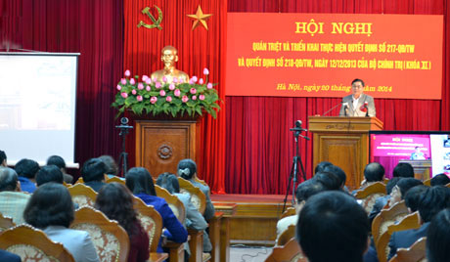(VOVworld) – The 2013 Constitution and Decision 217 of the Politburo on “Social supervision and criticism regulation of the Vietnam Fatherland Front and social and political organizations” have confirmed the people’s mastery in society. The implementation has effectively promoted people’s intellect in exercising social supervision and criticism.
 |
| The Fatherland Front of Hanoi organized a conference on social supervision and criticism regulation of the Vietnam Fatherland Front and social and political organizations. |
Resolutions of the 10
th and 11
th Party Central Committee have raised high the social supervision and criticism function of the Vietnam Fatherland Front. The Front has exerted efforts to carry out this mission at the grassroots level.
Supervising the performance of the local administration
Since implementing the regulation “The Fatherland Front supervises cadres, state employees, and Party members in residential areas”, Phong Phu commune, Binh Chanh district, Ho Chi Minh city, has detected, investigated, and disciplined 25 cadres, state employees, and Party members. They were dismissed, moved to another position, or criticized in public. Strict punishment of cadres and drastic measures to correct mistakes in the locality have restored public trust, defined the Front’s role in supervision and criticism, and reinforced the Party and State apparatus. Huynh Thi Ut, chairwoman of Phong Phu commune’s Fatherland Front, said: "Previously, the supervisory program was general and the Front’s network exercised its supervisory role in many areas, which reduced the efficiency of supervision and criticism work. Since 2013, Phong Phu’s Fatherland Front has renovated the forms of social supervision and criticism by applying a corporate action plan covering many sectors."
Supervising public investment and policies for social beneficiaries
Prior to the issuance of Decision 217, many localities applied the public investment supervisory regulation under the Prime Minister’s Decision 80. Each residential community established a people’s inspection board to supervise social welfare programs. Last year, the Vietnam Fatherland Front launched a program to oversee the implementation of policies benefiting people who rendered service to the revolution. Nguyen Thien Nha, President of the Vietnam Fatherland Front, said: "The Constitution defines the obligations and authority of the Front on supervision and criticism. But we don’t have a Law or ordinances on social supervision and criticism. After piloting a program to oversee the enforcement of policies benefiting social contributors, we found that when government agencies asked the Front to get involved and relevant agencies had to pass information to the Front, the Front exercised its supervision and criticism role more easily."
Enhancing supervision and criticism to promote people’s intellect
The 2013 Constitution and the Politburo’s Decision 217 underline the role of the Vietnam Fatherland Front in inspiring and rallying people’s intellect via the implementation of social supervision and criticism regulation. Dang Van Khoa, a member of Ho Chi Minh city’s Fatherland Front, said: "In implementing the social supervision and criticism function, it’s important to inspire people to participate voluntarily and constructively. This will improve the outcome of our work."
The Fatherland Front has been asked to work out an annual plan and submit it to the Party committee and the administration at the same level before implementing it. In particular cases, the Front can conduct unexpected supervision. The Front’s social supervision and criticism work has contributed to a Party and State of the people, by the people, and for the people.